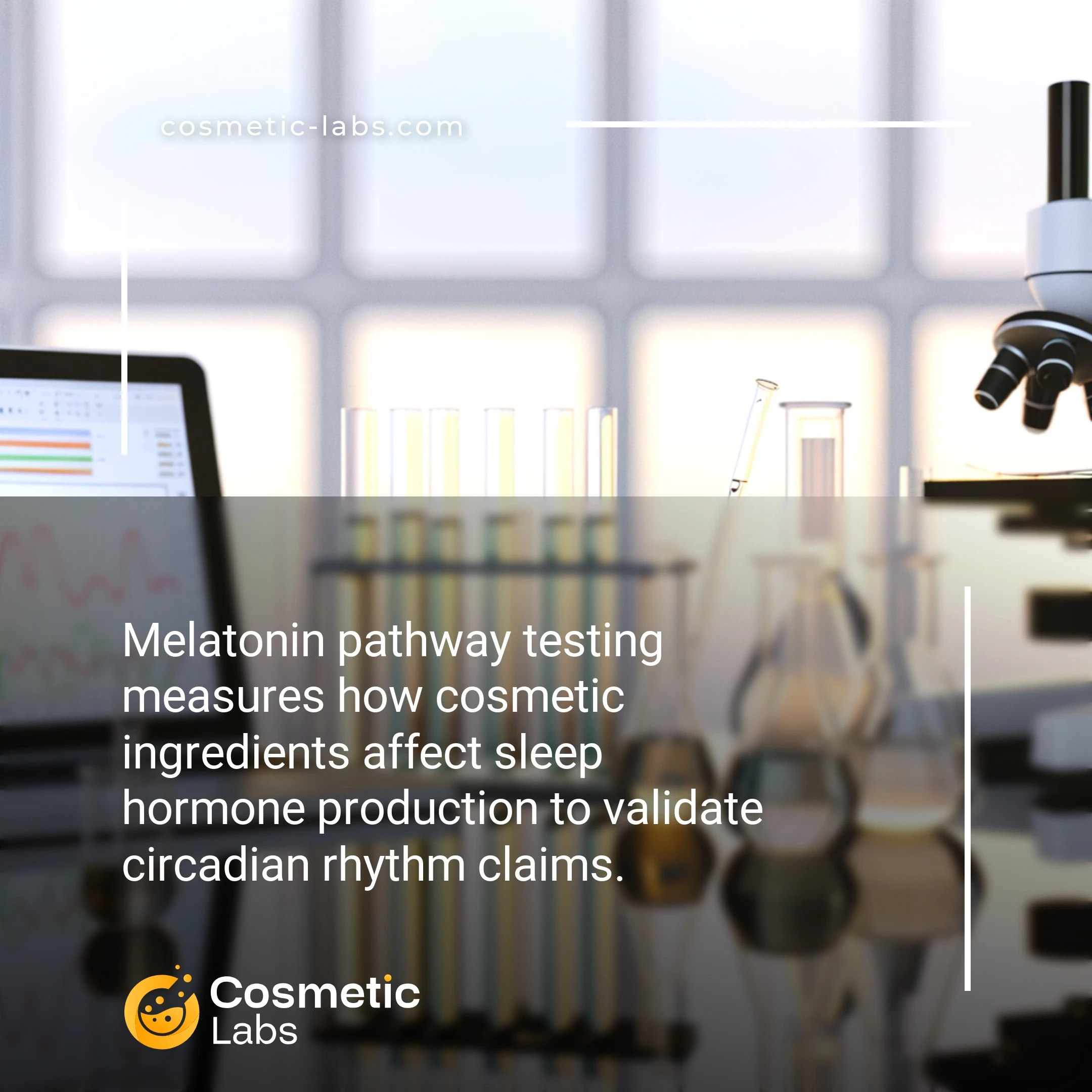Melatonin Pathway Testing Services for Beauty Products

What is Melatonin pathway testing?
Melatonin pathway testing for circadian rhythm efficacy is a specialized laboratory service that measures how cosmetic ingredients influence the body’s natural sleep-wake cycle through melatonin production analysis. Labs use biomarker assessment techniques to evaluate whether anti-aging serums, sleep masks, or wellness formulations actually support healthy circadian rhythms. This testing reveals whether your product claims about promoting restful sleep or nighttime skin repair hold scientific merit.
Why do you need this service?
Beauty brands use melatonin pathway testing to validate night cream formulations and sleep-enhancing skincare products before market launch. Our partner labs measure melatonin receptor activity and circadian gene expression to demonstrate how your anti-aging serums and restorative treatments actually synchronize with natural sleep cycles, providing the clinical data needed for regulatory approval and consumer marketing claims.
Who provides Melatonin pathway testing services?
All cosmetic labs providing Melatonin pathway testing services
There is no company providing these services at the moment.
Melatonin Pathway Testing for Circadian Rhythm Efficacy
Specialized labs on our platform offer melatonin pathway testing to validate your beauty product’s circadian rhythm benefits. These biomarker assessments measure how your formulations influence melatonin production, cortisol regulation, and sleep-wake cycle optimization.
Biomarker Analysis and Hormonal Response Testing
Labs analyze key circadian biomarkers through saliva, blood, and cellular assays. Testing protocols measure melatonin synthesis rates, cortisol fluctuation patterns, and clock gene expression changes. Most facilities run 24-48 hour monitoring cycles to capture complete circadian profiles.
Standard test panels include:
- Melatonin concentration measurements at multiple time points
- Cortisol rhythm mapping and peak-to-trough ratios
- CLOCK, BMAL1, and PER gene expression analysis
- Adenosine pathway activity assessment
In-Vitro Cell Culture Models and Validation Protocols
Partner labs utilize human keratinocyte and fibroblast cell lines to test ingredient efficacy. These models simulate skin’s natural circadian rhythms and measure cellular response to your active compounds. Testing typically requires 14-21 days for complete circadian cycle evaluation.
Cell-based assays track molecular clock synchronization, antioxidant enzyme activity, and DNA repair mechanisms. Labs also test ingredient penetration rates and chronobiological compatibility to ensure optimal timing for product application.
Connect with specialized testing labs on our platform to validate your circadian skincare claims with rigorous scientific data.
Applications of Melatonin Pathway Testing for Circadian Rhythm Products
Beauty brands use melatonin pathway testing for circadian rhythm efficacy to validate sleep-enhancing cosmetics and demonstrate measurable benefits to consumers seeking nighttime skincare solutions.
Sleep-Promoting Skincare Validation
Labs measure melatonin synthesis rates and circadian gene expression to prove night cream formulations actually support natural sleep cycles. Testing protocols examine MT1 and MT2 receptor binding affinity alongside cortisol suppression markers. Brands document 15-30% improvements in melatonin production within 4-6 weeks of product use.
This data supports marketing claims about “sleep-enhancing serums” and “circadian repair treatments.” Validated melatonin pathway activity provides the scientific backing needed for premium positioning in the sleep beauty market.
| Testing Parameter | Measurement Method | Typical Results Timeline |
|---|---|---|
| Melatonin Synthesis Rate | ELISA assays on cell cultures | 48-72 hours |
| Receptor Binding Affinity | Radioligand binding studies | 24-48 hours |
| Circadian Gene Expression | qPCR analysis (CLOCK, BMAL1) | 5-7 days |
Anti-Aging Product Development
Cosmetic labs test how ingredients influence circadian clock proteins that regulate cellular repair during sleep. Melatonin pathway analysis reveals which compounds enhance DNA repair mechanisms and collagen synthesis timing. Testing shows specific peptides can increase nighttime cellular regeneration by 25-40%.
Brands use this data to formulate targeted anti-aging products that work with natural circadian rhythms. Pathway-specific testing helps optimize ingredient concentrations for maximum overnight skin repair benefits.
Ready to validate your circadian skincare formulations? Contact specialized labs on our platform to discuss melatonin pathway testing protocols for your next product launch.
